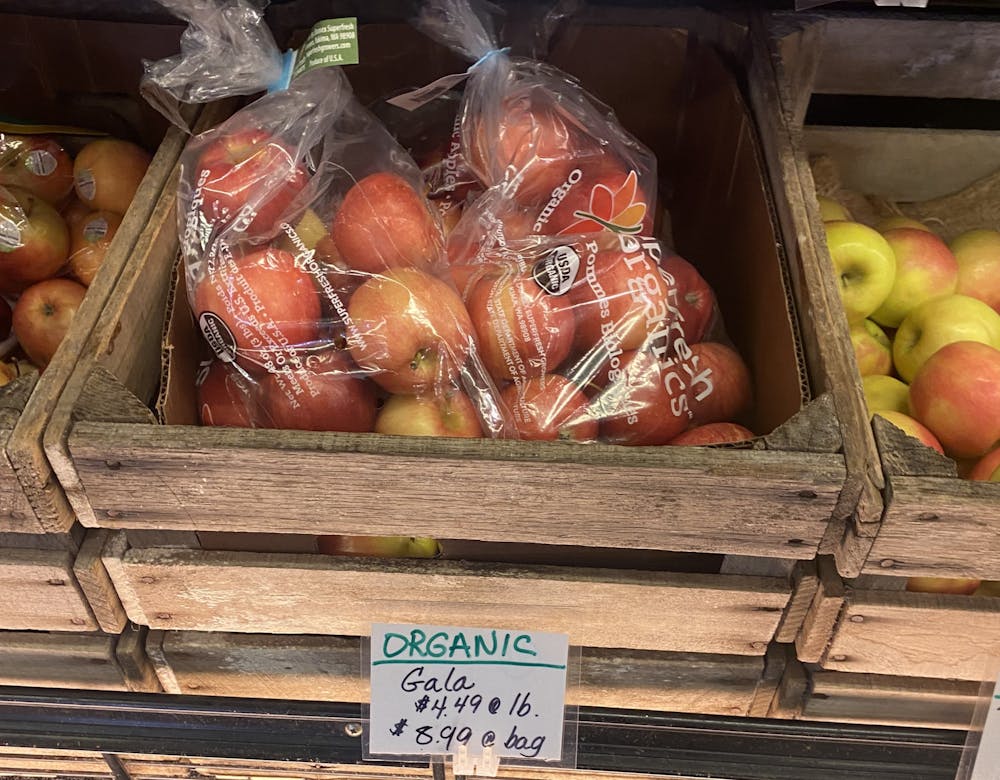Whether it’s ditching plastic silverware or choosing public transport, it’s easy to feel pressured to make some lifestyle changes in the face of the climate crisis. While some of these can be fairly easy to implement, others are more difficult — especially for college students.
Buying local food can reduce carbon emissions, plastic use and food waste, all while benefiting the local economy and one’s health. Moon Co-Op, a cooperatively owned grocery store in Oxford, reflects these benefits. James Rubenstein, professor emeritus of geography and treasurer of Moon Co-Op, says the store’s “zero waste ecosystem” ensures unsold food goes to their deli or local charities. The store is also an incubator for aspiring entrepreneurs.
“We are the first place that somebody who wants to become a professional can sell her products,” Rubenstein said.
The Oxford farmers market operates in a similar way, allowing individuals the opportunity to buy or sell locally sourced and fresh food. With these options, making the change to local may seem like a no-brainer, yet some Miami shoppers still decide against it.
In some aspects, large corporations remain more accessible for Miami students. They tend to be open longer and offer a bigger selection. “The hours aren’t good for me,” said Brooklyn Vauthier, a first-year architecture student and Kroger shopper. “I like the [Kroger] selection.” Shoppers who prefer local food often have to turn to larger supermarkets as well, despite their ideal preference. Victoria Simich, a sophomore studio art major, shops at the farmers market on Saturdays, but it can’t meet all of her grocery needs.
“I also don’t like that, you know, I can’t get everything here and then I do, unfortunately, have to shop from a bigger brand,” Simich said.
Additionally, prices at Kroger remain lower. While apples are sold for as low as $4.49 for three pounds at Kroger, Moon Co-op’s apples are $4.49 per pound.
Although the products may seem identical, local and commercial foods provide different sets of needs and values to shoppers rather than creating traditional competition. Rubenstein said Moon Co-Op operates in a symbiotic relationship with Kroger, not a direct rivalry.
However, local food and its values may be appealing to an increasing number of students according to Rubenstein. He estimates that Moon Co-Op has gone from 25% to 40% student shoppers in terms of sales. These shoppers include members of environmental clubs, sports teams, and both on and off-campus residents. They even experience a summer dip in sales when students leave Oxford.
Despite difficulties, local food sellers are working hard to build a community and make their products more accessible. Moon Co-Op’s mission is not just to sell and profit on food, but to be “a local service” as well.
“But we lose money, and you know, a significant amount of money because Americans are used to paying low prices for dairy and produce even though from our point of view, it’s nutritionally empty,” Rubenstein said.
The farmers market attempts to build its community in a similar way, by giving out a free apple and market dollar (paper credit equivalent to one dollar) to any first-time visitors, and those who bring a new customer. Additionally, customers can find booths handing out free gifts such as mini paintings.
Enjoy what you're reading?
Signup for our newsletter
Although local food has its drawbacks for some students, sellers are working to bring both accessibility and community to them–and students are noticing.“I like the community, for sure,” Simich said. “But also I feel more connected with my food knowing that somebody took their time to grow it.”




